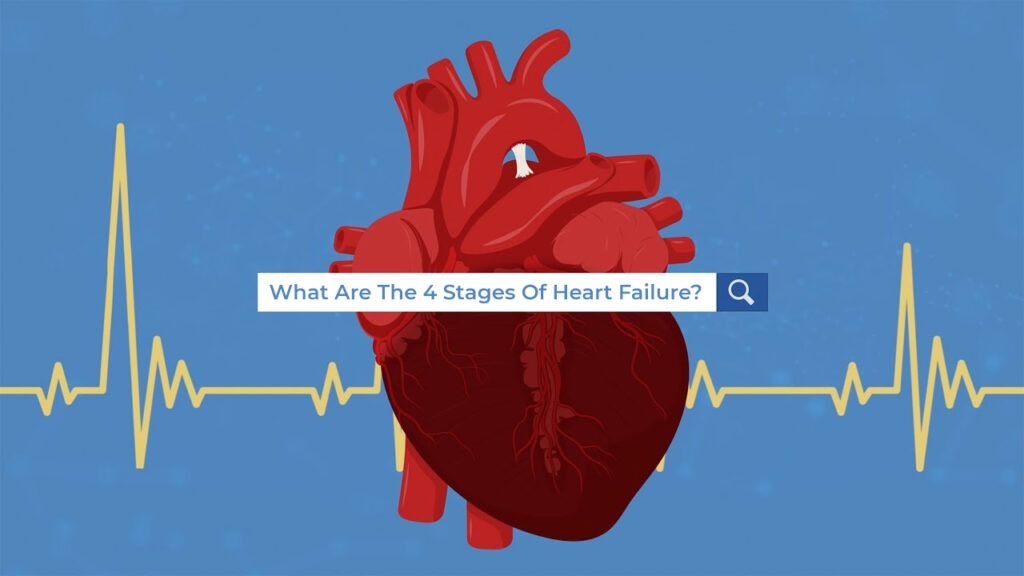Heart failure affects thousands of people daily around the world. It is a dangerous condition in which your heart cannot circulate enough blood in your body. While it is quite serious, it can be managed and treated so that you can live a completely normal life, especially if identified early enough.
Heart failure can progress, so researchers have defined four stages: A, B, C, and D. Heart failure is also classified by healthcare professionals if it has progressed to stages C and D. This categorisation assesses a patient’s overall cardiac function and the severity of their symptoms.
Stages of Heart Failure:
These four stages help your cardiologist determine how serious your condition is and what kind of treatment you need. Mentioned as following:
Stage A – Heart Failure:
People with stage A HF do not yet have problems with their heart’s pumping action, but they are at high risk of developing HF due to linked disorders. Conditions to consider include chronic high blood pressure, diabetes, and coronary artery disease.
At this stage, a person normally has no HF symptoms, but they may have symptoms from other chronic diseases. People with this stage of HF have no problems with the structure of their hearts or how they function. The goal of treatment should be to manage risk factors.
Stage B – Heart Failure:
At this stage, structural heart disease develops, such as decreased heart pumping and an enlarged left ventricle. It may also result from a previous heart attack. The majority of people in stage B still do not develop HF symptoms. A doctor may give medicine at this point to help manage and prevent future problems.
Stage C – Heart Failure:
At this stage, people start to show symptoms of HF associated with underlying structural heart disease, such as exhaustion or shortness of breath. These symptoms are mainly caused by difficulties with the left ventricle’s squeezing function, or the pumping chamber of the heart.
This stage of HF also includes persons who no longer have symptoms but are being treated for earlier symptoms and difficulty those who were hospitalised for a heart failure exacerbation. Some common may symptoms include:
- Fatigue
- Breathlessness
- Difficultly breathing
- Lower extremity edema (swelling)
- Rapid weight gain
- Abdominal distension
Stage D – Heart Failure:
People in stage D will have extensive structural heart disease and experience considerable symptoms even while they are at rest. Some common symptoms may include:
- Shortness of breath
- Difficulty breathing
- Swelling of legs, arms, hands, and ankles
- Fatigue
- Nausea
- Rapid heartbeat
- Lightheadedness
- Persistent cough
This level is severe and could require extensive, specialised treatment. This may include:
- Mechanical Circulatory Support
- Inotropic infusion for increased heart rate
- Heart transplant
- Hospice care/under observation.
Can Heart Failure Be Reversed?
Most people cannot reverse heart failure, therefore they must manage it with the right medication. However, treatment is primarily dependent on the stage of heart failure. Even though heart failure cannot be completely treated, numerous treatments can help to manage the symptoms. These include medications, surgeries, and surgical implants.
There are various lifestyle adjustments you may make to slow down heart failure, such as avoiding drinking, smoking, and narcotics. It is important to emphasise that exercise and a good diet are essential in this process.
What are the Causes of Heart Failure?
Heart failure is more likely to occur in those who have other heart-related diseases or lifestyle factors. There are several risk factors for heart failure, including:
- Congenital heart anomalies
- High blood pressure or cholesterol
- Coronary heart disease
- Valvular heart disease
- History of heart attacks
- Misuse of alcohol or illegal drugs
- Smoking tobacco
- Age factor
When to see the Cardiologist?
It’s a good idea and necessary to see your cardiologist for a healthy heart check if you have a family history of heart failure or heart disease, or if it’s been a while since your last checkup.
The German Heart Centre‘s expert cardiologists are available to help you at all times. We have a variety of heart tests to assist us figure out what is going on, and we can advise you through any treatment options that may be required. We understand how tough dealing with this can be, which is why we place such a high value on providing great patient care and expert advice.
So, don’t wait and book your consultation session with us! Expert advice, routine checkups and prevention is better than losing your precious life.

